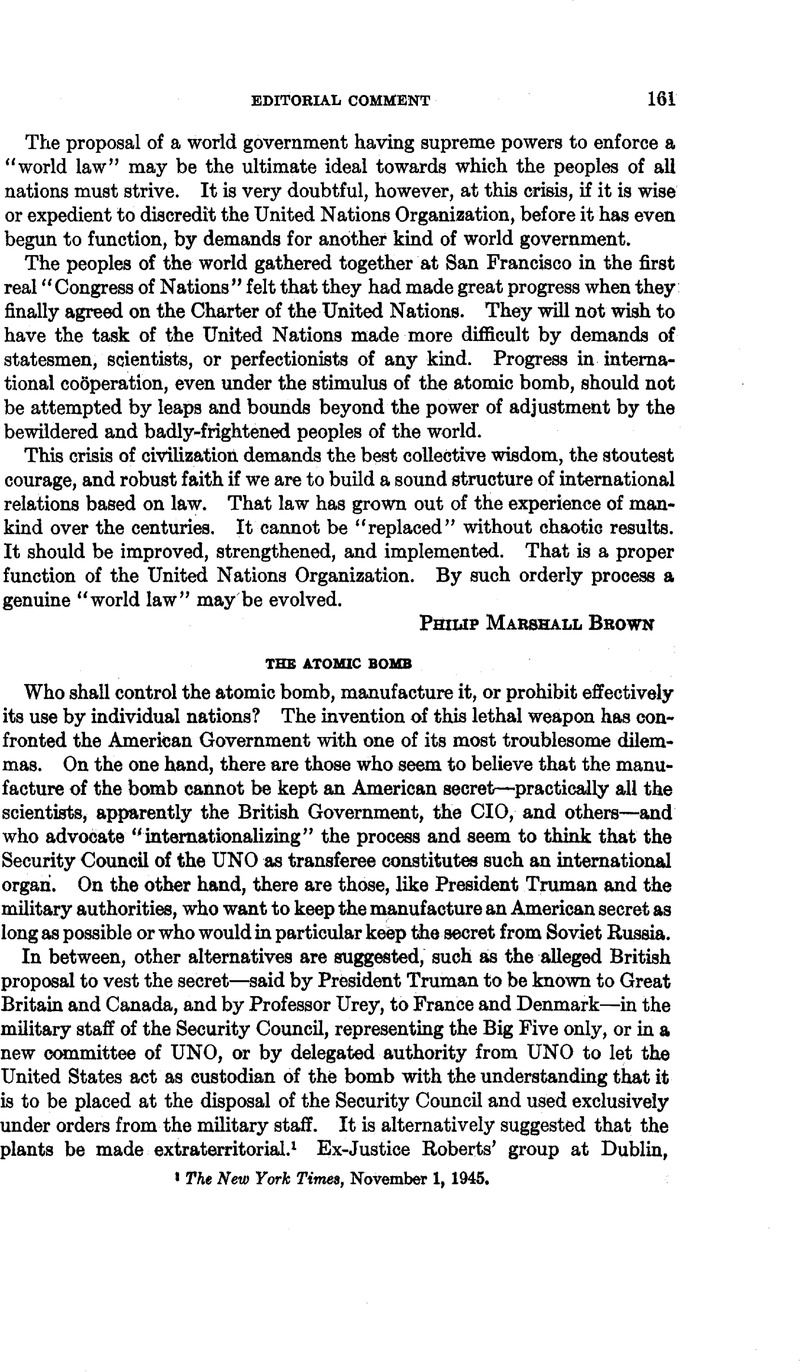
1 The New York Times, November 1,1945.
2 See also Norman Cousins, Modem Man Is Obsolete, New York, 1945, reviewed by John Davenport in same, November 4, 1945.
3 Same, November 16, 1945. There is objection to the exclusion of Russia from the conference. “Sixty Days to War or Peace,” in The New Republic, November 26, 1945, p. 691.
4 With the veto power in each of the Big Five, and the reserved right of UNO to cross the territory of any smaller power, it seems unusual to speak of the “equality” of states; see Report on the Charter by the Secretary of State, June 26, 1945, p. 157. Former Secretary Eden in the House of Commons, on November 22, 1945, addressed a plea to the Big Five for the abandonment of the veto power and other indicia of sovereignty. The New York Times, November 23,1945.
5 A ban on industrial activities imposed by the Potsdam Agreement, which imposes the victor’s will upon the vanquished and, in confiscating enemy assets, disregards the rights of private property. Russia’s alleged removal of machinery and personalty is explained in part on the ground that by alleged governmental control it became public property. A Chinese philosopher some years ago condemned the Treaty of Versailles—from which much of Europe’s troubles emanate—as the “most uncivilized paper written since men knew how to record thought” and then prophesied that it would “lead to more wars.” John Bassett Moore, Collected Papers, New Haven, 1944, Vol. VI, p. 432.
6 The New Republic, Vol. 113 (November 5, 1945), p. 588, says editorially:
As long as we refuse to share the bomb with the rest of the world by placing its manufacture under international control, all our lofty sentiments, all our professions of peace and all our insistence on democratic processes will simply sound hypocritical to the other peoples of the world. The government’s plan to exchange fundamental scientific information on atomic energy with other nations, but not to discuss “the processes of manufacturing the atomic bomb or any other instruments of war,” will surely give the impression that we intend to wield the bomb as a big stick in our foreign relations.
7 On the assumption that the process of manufacture, if not the scientific formula, can be kept secret, the proposal for national control of the bomb is embodied in the Johnson-May bill. This was adopted by the committee after hearing only eight witnesses, and the method has given rise to much objection. All but one scientist seems to have opposed secrecy. The bill sets up an advisory group of nine commissioners appointed by the President, two paid commissioners to have virtual control over developments in atomic energy, except in time of war, when the Army has control. The commission is to control government stocks of ores, Federal lands containing ores, and government plants and processes. They may condemn private property having these resources. The managers would conduct researches and experiments for the use of atomic energy for all purposes. The security regulations are strict and carry heavy penalties. This is deemed by opponents of the bill, who are the majority of the scientists, an effort at totalitarian control. The McMahon committee of eleven in the Senate which is to work out a system of regulation, superseding, as it would, the Attlee-Truman-King executive agreement, seems, if we are to judge by its chairman, to favor sharing the secret under certain conditions, by giving it to the UNO. Professor Gray of Illinois testified that under the Senate bill introduced by Senator Magnuson, the results of government research “could be turned over to some private corporation on a monopoly basis.” There seems to be general agreement that this must not happen.
8 In his speech of October 31,1945, in New York, Secretary Byrnes reaffirmed the American policy of non-intervention, but qualified it by saying (The New York Times, November I, 1945, p. 4):
We have learned that tyranny anywhere must be watched (more than watching marks recent policy!—E. B.) for it may come to threaten the security of neighboring nations and soon become the concern of all the nations. If, therefore, there are developments within the inter-American system which, realistically viewed, threaten our security (note the transition!) we consult with other members in an effort to agree upon common policy for our military protection.
At Montevideo, Buenos Aires, and Lima, the United States committed itself to non-intervention in the external or internal affairs of our neighbors to the south. This abnegation has been criticized as too sweeping and unrealistic. S. P. Bemis, The Latin-American Policy of the United States, New York, 1943, pp. 226, 276. It is unsafe to rely on American policy in the face of the somewhat contradictory record. Compare the statement of Assistant Secretary Berle with that of Senator Fulbright, this Journal, Vol. 39 (1945), p. 771, note 11. Harold Laski, in denouncing Franco in Spain, has also said: “The day of non-intervention [in foreign internal affairs] is over.” See criticism of this new doctrine in W. A. Orton, The Liberal Tradition, New Haven, 1945, pp. 231 and ff.
9 The New York Times, November 20, 1945, p. 3.
10 It must be admitted that evidence of a genuine internationalism is sadly lacking. The demand for national conscription in peace, coming after two world wars, the pride taken in a monster navy, the celebration of Navy Day, the receptions given in this country to Messrs. Eisenhower, Wainwright, and Nimitz, are hardly manifestations of a growing internationalism. Wars promote not internationalism but nationalism. And yet, since an atomic bomb race signifies the possible passing of the human species, the nations may find the necessary courage to vest control of the bomb and the destruction of all the incidental works in an international group having this authority only. If successful in this experiment, the nations might be willing in time to go somewhat further. The gap between international science and national politics and economics was never more ominous.